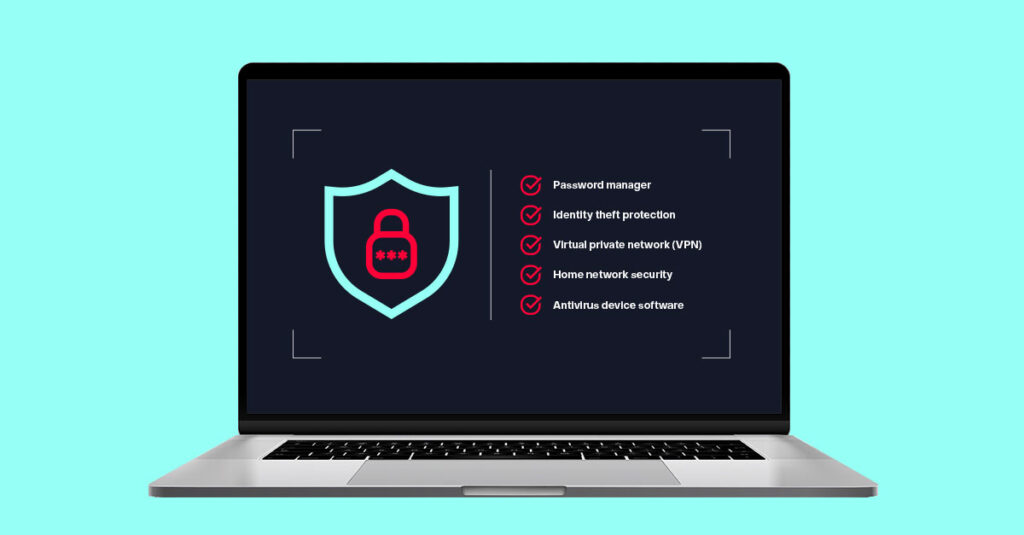
5 Cyber Security Must-Haves
While you might think your online shopping, hopping on Zoom calls, checking your bank accounts, paying your bills, sending social media posts and uploading family photos isn’t of much interest to anybody, it’s all interesting to a hacker.
When you’re sending personal information, you need cyber security tools to protect it. Take a look at these five essential tools. It’s easy to get started and stay as safe as you can.
1. Password manager
A password manager does more than store your login information for easy access. It can also generate strong passwords, ensure repeated passwords don’t exist and use encryption to securely save personal data like credit card information. These features greatly reduce your risk of getting hacked.
While it’s tempting to use your browser’s default password manager, it’s not as secure as many third-party password managers. If anyone stole your device or hacked into any of your online accounts, it opens up the possibility of their having access to your stored passwords.
A password manager could help avoid this scenario. A hacker would need to know your master password to gain access, and as long as you choose a unique and strong password, the chances of them entering your password manager are minimal.
It may seem counterintuitive to store all your passwords in one place online, but it’s actually the safest way to keep your passwords secure as password managers use encryption to protect your data.
When choosing a password manager, you should look for an application that uses encryption, has no history of data breaches and is compatible with your preferred browser and operating system. Many password managers come in the form of a browser extension or app, making it easy to use.
2. Identity theft protection
Having your identity stolen from you is a stressful experience, and the repercussions could last for several years. That’s why investing in identity theft prevention is crucial to spotting the early signs that your identity is being misused by someone else. Identity protection services can monitor the dark web to discover if your personal data has leaked or check credit bureaus to see if your credit has suspicious activity.
A high-quality identity protection service will also help you determine what steps to take next if you suspect your identity is stolen. It can also show ways to protect yourself from leaked data on the dark web.
3. Virtual private network (VPN)
A VPN creates an encrypted tunnel between you and your network. Using a VPN is especially important if you frequently use public Wi-Fi, as these types of networks are often unsecured. A VPN app can ensure you’re safely protected from prying eyes.
VPNs are easy to install and use. Simply pick a server to connect to, and the VPN will give you an IP address to mask your real one. You’ll hardly ever notice it during your online browsing, and it’s a quick way to protect your data.
4. Home network security
Your home network also needs its own security measures to stay protected. Anyone within range of your network can potentially access it and use it for fraudulent purposes. Luckily, there are a few simple ways to protect your home Wi-Fi network:
- Install a VPN on your router to ensure all connected devices are using an encrypted connection.
- Change the default passwords to your router and network. The default passwords are widely available online, and it makes it easy to hack into your network. Change your passwords to unique and strong login credentials.
- Use the most current router to ensure you have the highest security tools possible.
- Make sure your router’s firmware is routinely updated. Most routers do this automatically, but you should confirm this.
- Create a guest network. Guests to your home frequently ask for the Wi-Fi password. By creating a network just for them, you can avoid putting your devices at risk if their devices have any viruses or spyware on them. With a guest network, visitors have access to your internet connection, not any of your devices or shared files. You can set up a guest network through your Wi-Fi router’s settings.
5. Antivirus device software
Viruses and other malicious software are designed to sneakily enter and gain access to your devices. So it’s usually unlikely that you’ll notice the threat at first. This is why having antivirus software is an important part of your cybersecurity toolkit. It can routinely scan your devices to detect viruses and other threats. Beyond noticing cyber threats, it can also help you remove them before they completely take over your device.
While protecting your computer, don’t forget your phones and tablets! Your mobile device is also susceptible to viruses while you’re browsing, opening email attachments or downloading new apps. A basic antivirus app will periodically scan your phone and ensure there are no threats. You may find that some antivirus apps have additional security features like anti-theft protection and parental controls.
Multi-device security can ultimately help ensure all your devices are secured from threats and protect your personal information while you’re shopping or banking online.
Frontier Fiber is built for the way you live today—and tomorrow
If you’re still on the lookout for the right ultrafast internet connection for streaming, gaming, working from home and running your smart home—all with enough bandwidth for everyone—find out about Frontier Fiber. Frontier Fiber is available in select areas — check here to see when it’s available at your address. Once you have it, keep your identity and devices protected with Frontier’s security support.
Product features may have changed and are subject to change.




Join the conversation